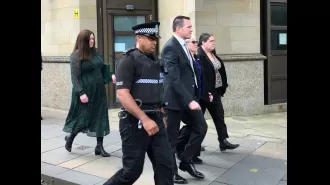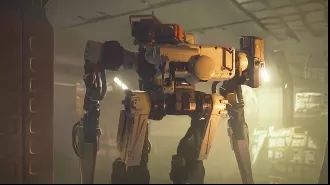90s files show UK was aware of major nuclear war issue.
UK cable warned of dangerous Ukraine-Russia relationship.
November 3rd 2024.

In 1991, when Ukraine gained its independence after the collapse of the Soviet Union, it also inherited a large nuclear arsenal. Recently released documents reveal that the UK was privately concerned about the potential threat from Russia as Ukraine made the decision to give up its inherited nuclear weapons. The documents also show how Moscow wanted Greenpeace to inspect the arsenal in the 1990s, adding to the already tense situation.
At the time, the West was encouraging non-proliferation and discussions were taking place about the Budapest Memorandum, in which Ukraine agreed to relinquish its weaponry. British diplomats, who filed these confidential documents, seemed to have a sense of foreboding about Russia's dangerous and unpredictable actions. Little did they know that these assessments would become prophetic in the years to come, as we now look back at the military aggression and invasion led by Vladimir Putin in 2014.
Decades later, these messages have been released to the public, shedding light on the intelligence and discussions that took place as Ukraine made the decision to give up its nuclear weapons. One document states that while there were valid concerns on both sides, the Russian view that Ukraine was trying to hold them hostage on crucial bilateral issues was not unfounded. The West, on the other hand, had reasons for resisting Ukraine's pleas for intervention, but also recognized the importance of taking steps to prevent the relationship between the two countries from going off the rails.
Commentators today are divided on whether Russia would have still taken military action against Ukraine in 2014, including the annexation of Crimea, if Ukraine had kept its nuclear arsenal. However, these documents, released at the National Archives in London, show that the UK was well aware of the potential for conflict in the region. Another confidential cable warns that the most dangerous flashpoint was between Russia and Ukraine, with many potential points of conflict that could only be resolved through diplomacy.
These documents, although not signed, were distributed within the UK government, including the Ministry of Defence and Cabinet Office. They provide a glimpse into the behind-the-scenes discussions and concerns as Ukraine gave up its nuclear status. In return for giving up their arsenal, Ukraine received security assurances from Moscow and other signatories, such as the UK and the US. The final warheads were transferred to Russia in 1996.
In another document, there is a detailed discussion about the safety of the nuclear weapons in Ukraine. It reveals that Georgiy Mamedov, then the Russian deputy foreign minister, suggested that Greenpeace should inspect the weapons. However, this idea was challenged by the author of the document, who believed that Greenpeace lacked the expertise and had a known bias against nuclear weapons. Instead, they suggested that the International Atomic Energy Agency (IAEA) should carry out the inspections.
The documents also reveal that Mamedov had warned that the weapons would become too dangerous to move after 7-8 months, adding to the urgency of the situation. The Ukrainian ambassador had also hinted at the weapons' unsafe condition during a press conference, causing concern among the UK government. These exchanges took place in the months leading up to the signing of the Budapest Memorandum, in which the UK, US, and Russia provided security assurances to Ukraine.
In 2014, researcher Mariana Budjeryn wrote about the failure of the Budapest Memorandum to deter Russian aggression. She noted that the perceptions of a Russian threat to Ukraine's territorial integrity, which were a key factor in their demands for security guarantees in the early 1990s, proved to be justified. The lack of immediate consequences for violating the memorandum made it ineffective in deterring Russia's actions.
Today, Putin continues to use nuclear threats as a way to intimidate the West in its relationship with Ukraine. With the world's largest inventory of nuclear weapons, Russia's actions cannot be taken lightly. Some analysts believe that the West needs to stand up to these threats in order to provide Ukraine with the weapons it needs to defend itself. As one expert put it, the West needs to show some "cajones" in the face of Putin's nuclear rhetoric and not give in to his tactics of "salami slicing" the provision of weapons.
At the time, the West was encouraging non-proliferation and discussions were taking place about the Budapest Memorandum, in which Ukraine agreed to relinquish its weaponry. British diplomats, who filed these confidential documents, seemed to have a sense of foreboding about Russia's dangerous and unpredictable actions. Little did they know that these assessments would become prophetic in the years to come, as we now look back at the military aggression and invasion led by Vladimir Putin in 2014.
Decades later, these messages have been released to the public, shedding light on the intelligence and discussions that took place as Ukraine made the decision to give up its nuclear weapons. One document states that while there were valid concerns on both sides, the Russian view that Ukraine was trying to hold them hostage on crucial bilateral issues was not unfounded. The West, on the other hand, had reasons for resisting Ukraine's pleas for intervention, but also recognized the importance of taking steps to prevent the relationship between the two countries from going off the rails.
Commentators today are divided on whether Russia would have still taken military action against Ukraine in 2014, including the annexation of Crimea, if Ukraine had kept its nuclear arsenal. However, these documents, released at the National Archives in London, show that the UK was well aware of the potential for conflict in the region. Another confidential cable warns that the most dangerous flashpoint was between Russia and Ukraine, with many potential points of conflict that could only be resolved through diplomacy.
These documents, although not signed, were distributed within the UK government, including the Ministry of Defence and Cabinet Office. They provide a glimpse into the behind-the-scenes discussions and concerns as Ukraine gave up its nuclear status. In return for giving up their arsenal, Ukraine received security assurances from Moscow and other signatories, such as the UK and the US. The final warheads were transferred to Russia in 1996.
In another document, there is a detailed discussion about the safety of the nuclear weapons in Ukraine. It reveals that Georgiy Mamedov, then the Russian deputy foreign minister, suggested that Greenpeace should inspect the weapons. However, this idea was challenged by the author of the document, who believed that Greenpeace lacked the expertise and had a known bias against nuclear weapons. Instead, they suggested that the International Atomic Energy Agency (IAEA) should carry out the inspections.
The documents also reveal that Mamedov had warned that the weapons would become too dangerous to move after 7-8 months, adding to the urgency of the situation. The Ukrainian ambassador had also hinted at the weapons' unsafe condition during a press conference, causing concern among the UK government. These exchanges took place in the months leading up to the signing of the Budapest Memorandum, in which the UK, US, and Russia provided security assurances to Ukraine.
In 2014, researcher Mariana Budjeryn wrote about the failure of the Budapest Memorandum to deter Russian aggression. She noted that the perceptions of a Russian threat to Ukraine's territorial integrity, which were a key factor in their demands for security guarantees in the early 1990s, proved to be justified. The lack of immediate consequences for violating the memorandum made it ineffective in deterring Russia's actions.
Today, Putin continues to use nuclear threats as a way to intimidate the West in its relationship with Ukraine. With the world's largest inventory of nuclear weapons, Russia's actions cannot be taken lightly. Some analysts believe that the West needs to stand up to these threats in order to provide Ukraine with the weapons it needs to defend itself. As one expert put it, the West needs to show some "cajones" in the face of Putin's nuclear rhetoric and not give in to his tactics of "salami slicing" the provision of weapons.
[This article has been trending online recently and has been generated with AI. Your feed is customized.]
[Generative AI is experimental.]
0
0
Submit Comment





